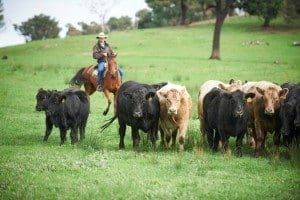It’s time for Australian farmer organisations to find ways to deliver more tangible and direct benefits to members as part of their membership offer without being distracted by the lure of compulsory levy funds as an easy solution to declining membership support, writes Australian Farm Institute executive director Mick Keogh.
 The much anticipated Government response to the Senate report on the future of levies and organisations in the beef industry has provided some clarity on the respective roles of industry organisations, and should provide greater certainty for all sectors of agriculture about how industry structures should operate in the future.
The much anticipated Government response to the Senate report on the future of levies and organisations in the beef industry has provided some clarity on the respective roles of industry organisations, and should provide greater certainty for all sectors of agriculture about how industry structures should operate in the future.
The Senate inquiry into industry structures and systems governing levies in the grass-fed cattle sector arose out of beef producer discontent about relatively low beef prices in Australia. At the time the inquiry was initiated, the high Australian dollar exchange rate and persistent drought throughout northern NSW and western Queensland was putting many beef businesses under considerable financial stress.
The main recommendations contained in the report arising from the Senate inquiry seemed to be more a reflection of the Senators confusion about the respective roles of industry organisations, than a blueprint for the future of industry structures. The report recommended that grass-fed cattle levies should be directed to a new producer-controlled organisation governed by a board directly elected by beef producers, and that this body should have responsibility for determining how those funds should be used. This recommendation seemed to be focused more on creating an industry representative body funded by compulsory levies, than it did on ensuring that industry research and marketing levies were being used in the most effective way to enhance industry profitability.
The Government response to the Senate recommendations has rejected that proposal, and in doing so has also sent a message more widely to industry representative organisations that the Government does not support siphoning off compulsory industry research and marketing levies to fund the operations of industry lobby groups.
This should not come as a surprise to anyone involved in agriculture. It has been a long-standing policy position of both major political parties, and is position that is supported for a range of different reasons. The first is that compulsory industry levies are collected under the Australian Government’s taxation powers, and the Government is accountable to the Parliament for the appropriate use of these funds.
If the Government agreed they could be used for lobbying and other political activity, then all sorts of conflict-of-interest issues arise, and it is almost certain the Government would want a very large say in the policy positions the money could be used to support. In effect, the industry would be handing complete control of its policy direction to the Government, something that few in the agriculture sector would see as a wise move.
The second reason that governments, and probably the majority of agricultural levy payers, do not support handing research and marketing levies to an elected representative body is that a farmer-elected representative body is unlikely to have available the appropriate mix of skills and experience to manage a large research portfolio or a long-term industry marketing program.
The approach taken by the government in responding to this Senate inquiry is consistent with the recommendations of the more recent Senate inquiry into levy-funded research, development and marketing organisations, and is also consistent with changes that have been made in industry arrangements in the horticulture sector, resulting in the establishment of Horticulture Innovation Australia. In both those instances, recommendations have been made or measures have been implemented to ensure that compulsory industry levies are not used to fund representative bodies or agri-political activities, and that any industry funding paid to representative organisations by levy-funded organisations is transparently for services the representative organisation has provided, and not to fund the organisation more generally.
The governments response to the grass-fed levy inquiry (and likely response to the broader Senate inquiry into levy-funded research, development and marketing bodies) presents a real opportunity for farmer representative organisations to undertake significant reform, and to develop new models and structures that are more valued and supported by farmers.
The recent Australian Farm Institute report on the future of farmer representative organisations in Australia highlighted that in a deregulated industry environment, and in an era where telecommunications provides widespread access to information, the free-rider challenge has become more significant, and farmer organisations will have to find ways to deliver much more tangible and direct benefits to members as part of their membership offer.
Its time for Australian farmer organisations to seriously take on this reform challenge, without being distracted by the lure of compulsory levy funds as an easy solution to declining membership support.

Mick, what a whole lot of spin, can’t say I agree with any of it, however I am sure all the others who live off the sweat and investment of grassfed levy payers will.
Well put Mick Keogh. As well as your final point Mick I would also like to suggest that you add ” and the lure of their own political enhancement rather than the well being of the membership”